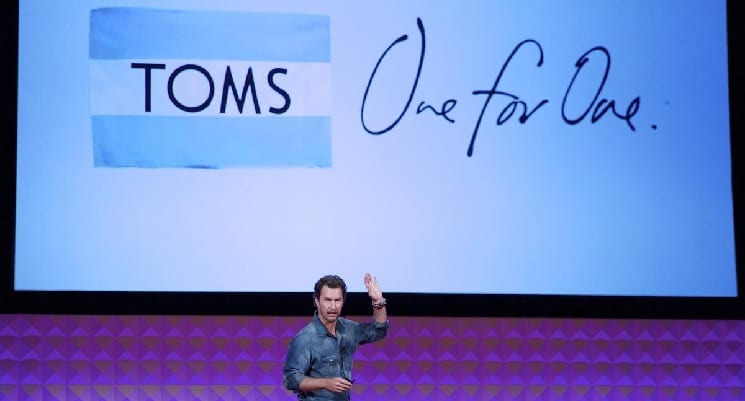(Pictured above: TOMS Shoes founder Blake Mycoskie)
by Julianne Ortmann (pictured right)
 What makes a company successful? One might say maximizing profits, exceptional customer service, recognition & rewards, employee satisfaction—the list goes on and on. But are those accurate measures of what makes a company recognized as truly successful? The success of your business ultimately boils down to how your products and services can positively impact the lives of consumers and humanity as a whole. In a society where people (and companies) support the notion of making a difference, tradeshow models are changing and their marketing efforts are reflecting the idea of giving back and doing good. Ask yourself this: how successful is your company?
What makes a company successful? One might say maximizing profits, exceptional customer service, recognition & rewards, employee satisfaction—the list goes on and on. But are those accurate measures of what makes a company recognized as truly successful? The success of your business ultimately boils down to how your products and services can positively impact the lives of consumers and humanity as a whole. In a society where people (and companies) support the notion of making a difference, tradeshow models are changing and their marketing efforts are reflecting the idea of giving back and doing good. Ask yourself this: how successful is your company?
TOMS Shoes, LLC, is a for-profit company that was one of the first, and now one among many, enterprises that have come up with creative ways of practicing social justice in marketing their business. TOMS’ business model is known as the “one-for-all concept,” which upholds their promise to donate free shoes to children in need around the world for every pair sold. When developing the idea, giving back was just as integral in their business model as making a profit was. With a focus of giving back a core part of their model and company message, TOMS has grown to a $400 million company and continues to do well while doing good for the world.
Studies show that more than 90 percent of consumers would switch to a brand that supports a good cause. With millennials taking over the workforce and accounting for trillions of dollars in spending power, they are the most sought-after audience for companies to target today. Seventy percent of their generation is willing to spend more money on products and switch to brands that are socially conscious. People want to support businesses that promote a positive impact, and this is extremely important to think about when building a strategy to target audiences in your tradeshow marketing plans.
Aside from the underlying importance of ultimately doing a good deed, adopting a business strategy to give back will not only help others, but your company’s tradeshow model and business as a whole. Operating a socially responsible industry will set you apart from the rest of your competitors and attract more consumers to your booth. While your opponents are focused solely on maximizing profits and selling you on sales pitches, you are building a brand that is sending a message to your audience that shows you care about making the world a better place. Implementing this strategy into your business and tradeshow model won’t fast-track profits overnight, but taking action now will be securing a lucrative tomorrow.
TOMS’ business model is unconventional yet simple, and they’ve made millions in revenue by giving away shoes to those in developing countries who are unable to make this simple purchase. They have proven that it is possible to operate a successful, profitable business while upholding a social purpose. How do they still generate revenue? Companies spend most of their budget on advertising, but a company that instills good in humanity builds a community of people who will recommend and promote their products through word of mouth and social media to reach more customers. Inspiring change is bound to be recognized by the media, written about in articles, talked about online and among attendees—the possibilities are endless. This buzz around your company’s well-doing will save you money on tradeshow advertising and generate free publicity in favor of your company’s image.
Not only will this shift make more people want to learn about your company and do business with you, it also alters the mindset of people who work for you and sell your products at tradeshows. It is difficult to interact with every single employee, especially in a big corporation. Many organizations don’t go beyond writing a paycheck, so establishing charitable initiatives can give employees a drive and make them feel good about working for a company. Participating in a philanthropic enterprise instills pride and purpose in your team and builds a connection to the workplace and its brand. A true love and passion for what you do is reflected in better employee morale and retention and can be a key differentiator when speaking with potential new hires.
“We make a living by what we get, but we make a life by what we give,” said Winston Churchill. By deeply integrating giving back in your company’s identity and tradeshow marketing concept you will set yourself apart from other companies, inspire your employees and customers and advance a positive shift in the world. Humanize your brand and connect to those around you while encouraging other businesses and people to join you in doing good for the world. What will your company do to make a difference?
Julianne Ortmann is a client services representative for Marketcom PR, a B2B-oriented communications boutique committed to helping clients achieve the results they need to sell more effectively in their marketplaces. A recent graduate of Florida State University with a B.S. in Marketing, Ortmann is responsible for supporting client marketing initiatives across a variety of financial services, non-profit and B2B industries. For more info, visit www.marketcompr.com .
This story originally appeared in the September/October issue of Exhibit City News, p. 24-25. For original layout, visit https://issuu.com/exhibitcitynews/docs/ecnflipbook_septoct_2019_web






























